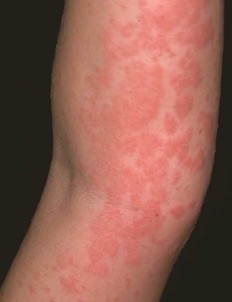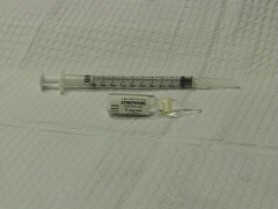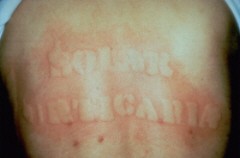Conveniently located to serve Newnan, Peachtree City and LaGrange
Click here to jump to:
Newnan Hives Treatment
WHAT ARE HIVES?
Hives or (urticaria) refers to a skin rash which can result in severe itching and swelling. The eruption usually lasts for a only a few hours, before fading, and eventually disappears. Hives can erupt on a more persistent basis. The hive or “welt”, can vary in size, shape and texture. Hives are produced by the release of “histamine”. Histamine is found in cells that are found in both skin and lung tissue. Medication, food and environmental influences, e.g. stings, can cause hives to develop. Other factors such as stress, changes in body temperature, pressure, vibration and exertion can cause hives to appear. It is important to keep a log of recent food intake, medication changes, or changes in your health if you notice a pattern with your hive eruption. This can often help us to determine the source of the problem.

ARE THERE ANY SERIOUS THINGS TO WATCH FOR WITH HIVES?
In rare instances, trouble with breathing or swallowing can occur with a hive reaction. This is considered serious because a life threatening respiratory or blood pressure issue can occur, something we refer to as an anaphylactic reaction. If you experience dizziness or difficulty with swallowing or breathing after an insect bite or a meal, it is important to let our office know immediately or to go to the nearest ER immediately.. An EpiPen™ should be carried by you at all times. This will help you in such an emergency, when there is no other available person or persons to assist you.
HOW ARE HIVES CLASSIFIED?

Hives can be classified as either physical, infectious, chronic, drug, stress, temperature, or food related. Acute urticaria lasts less than six weeks. In acute urticaria, the cause is easily identifiable and can be readily eliminated. Sometimes, hives can be perplexing because no cause is ever found and the eruption proves to be no more than a temporary nuisance.
Related
Content
Patient
Review
“Dr. Harvey was fantastic (Love at first sight!). I will highly recommend him. I wish Dr. Harvey all the luck in the world.”
by Anonymous
SOURCES OF HIVE ERUPTIONS:
- Food. The most common foods that cause hives are peanuts, chocolate, fish, tomatoes, soy beans, berries and milk. Fresh foods cause hives to develop more often than cooked foods. Hives also can form after shellfish, dairy, or citrus ingestion. A careful history is crucial to eliminating these sources from the diet.
- Drug ingestion. There are many types of medications that can induce hives. These include penicillin, sulfa, codeine, morphine, and aspirin. Hives can also be triggered by blood pressure medication, antacids, ear and eye drops, laxatives and vaginal douches. When experiencing hives, it is important to relate the various medications that you are taking so as to find and eliminate the source of the rash.
- Infections. Viral infections, such as mononucleosis and bacterial infections, such as strep throat, are common causes of hives. Hepatitis and fungal infections can also be triggers. If you have suffered a recent infection or been exposed to somebody with an infection, let your doctor know so that he or she can review your medical history in a thorough manner.
WHAT ARE SOME OF THE RARER CAUSES OF HIVES?

As mentioned earlier, changes in pressure, vibration, temperature, emotion, or heat or cold changes can induce hives to form. Sunlight can also induce hives to form, a condition referred to as solar urticaria. Typically, this will occur immediately when going outside, into the sun, and resolves upon returning to a shaded area. Antihistamines usually treat these conditions readily and effectively.
HOW CAN THE NATURE OF YOUR HIVE ERUPTIONS BE FURTHER EVALUATED?
Besides taking a good medical history, RAST testing can be used to determine what type of allergen is causing your hive reaction. In some instances, prick testing may be performed in order to desensitize you to any culprit antigens that are detected.
WHAT IS THE BEST TREATMENT FOR HIVES?
The best treatment for hives is to avoid the aggravating factors that have been identified. Though not an easy task, careful attention to a medical log or diary can often save a lot of time and energy in assessing the cause of your skin rash. Antihistamines or corticosteroids, either orally or topically, are the mainstay of therapy for these disorders. On occasion, immunosuppressive agents or light therapy can be used. You may also need to be tested for diabetes, thyroid disease, and urine and stool infections. Dental abscesses can also be triggers so it is important to let us know if you have had recent dental work performed.
As mentioned earlier, if you suffer trouble with breathing, or develop blood pressure drops or throat swelling, an EpiPen™ should be used promptly. If this is not available, proceed to the nearest emergency room.
For more information on hives or to set up a consultation, click here. Thank you and we look forward to helping you.











